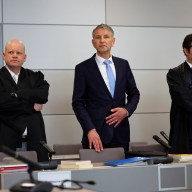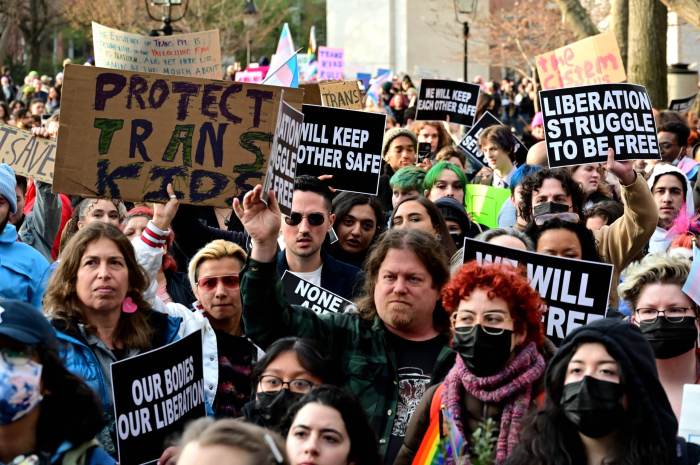CHICAGO – Kelsey Grammer makes it clear from the start: He’s not playing Mayor Richard M. Daley in the new dramatic series “Boss” that debuts Friday night.
Sure, his mayor of Chicago talks about being in charge for 22 years – the exact time Daley spent in office. For both men the job is also the family business, with Grammer’s Tom Kane following his father-in-law and Daley his father. And if Grammer’s character really wanted a disguise that nobody
would have recognized, he would have put on a Cubs hat and not one bearing the logo of Daley’s beloved White Sox.
“We were writing a show that is a derivative of Shakespeare (and) he’s got 400 years on the Daleys,” Grammer said this summer during filming in Chicago for the Starz drama (10 p.m. EDT).
Grammer told Daley as much, when the two met and he “tried to reassure him that we had absolutely no intention of taking pot shots at him and his father.” And it is certainly true there is nothing about Kane’s mannerisms, eloquent manner of speaking or look that even hint at Da Mayor.
At the same time, Daley and the hardball political world in which he grew up and then came to dominate are such an integral part of this story that Shakespeare’s “Richard II” would have worked as a title instead of “Boss,” which, just happens to be the name of the late Chicago columnist Mike
Royko’s famous biography of Daley’s father.
Viewers may not know the ins and outs of Chicago politics, but they understand this is a city where power, clout as they call it around here, is held in the hands of a few, from the days when Al Capone
ran his bootlegging empire here with the help of judges and politicians he kept in his pocket to the better part of the last half century when the mayor’s last name was always Daley.
Tom Kane’s power is helped, for example, by the stories, legends, really, of how Daley’s father had enough clout (not to mention the dead people he supposedly got to the polls) to put John Kennedy in the White House in 1960 and prompt Robert F. Kennedy eight years later to say the endorsement of
Daley, a mayor of a single city in the middle of the country “means the ballgame” to his own chances at the presidency.
It is the same with the son who, though not the national force as his father, could flex his own political muscles, as he did when he got tired of talking about turning a lakefront airport into a nature preserve and simply dispatched bulldozers in the dead of night to carve huge Xs into the runway.
Even former Illinois Gov. Rod Blagojevich, who is about to be sentenced for trying to sell or trade President Barack Obama’s old Senate seat, helps tell the story.
“The conceit of ours is to think of politics as cleaner now,” said Farhad Safinia, the show’s creator and executive producer. “Chicago shows it isn’t.”
“There’s such a colorful backdrop to tell this story that just exists in Chicago, so the city itself becomes kind of a character,” agreed Grammer. “We’re borrowing Chicago as a kind of magic kingdom (in which) you can believe is full of intrigue, betrayal, plot twists, secret documents and all kinds of things.”
Chicago’s history, both that of recent years and the distant past, are all thrown into the story. Grammer’s character Tom Kane, for example, in talking about digging up a cemetery to accommodate the expansion of O’Hare International Airport – a real event – brings up Abraham Lincoln and the
Underground Railroad. Kane talks about how the city was built, telling of figures such as the Rev. Jeremiah Porter, one of the city’s first reformers in the 1800s and Anton Cermak, a mayor in the 1930s.
“We have something occurring at night with bulldozers (after) an edict from the mayor,” said Safinia, who would not elaborate. “I keep finding stuff like the Xs in the runway.”
The filmmakers use many parts of the city, from the most violent and struggling neighbourhoods to the sparkling lakefront and the jewel of that lakefront, Millennium Park.
“We went into neighbourhoods that only people in Chicago know about,” said Dan Clancy, the show’s production designer who came up with some of the locations after talking to his father, a retired Chicago firefighter.
If the first two episodes are any indication, the show takes great pains to get the pronunciation of various names correct and when they talk about neighbourhoods, they put them where they should be and use the shorthand that is commonly used, referring to the University of Illinois at Chicago as
UIC, for example. And unlike other Chicago-based shows that put imagined addresses out in Lake Michigan, “Boss” was careful not to in the early episodes.
The crucial opening scene when viewers learn the meaning of the show’s tag line – “Betrayal Starts From Within” – takes place in a building that represents the city’s gritty and sometimes brutal past, complete with the hooks where slaughtered animals once hung that can be seen over Grammer’s
shoulder. That scene in which Kane learns he has a degenerative brain disease sets the tone for a story that is dark, certainly darker than the norm for Grammer, who is best known playing Frasier Crane in the comedies “Cheers” and “Frasier.”
Grammer said he did not study Daley or any other mayor, explaining that what he needed to know about Kane he already knew after nearly three decades as a TV star.
“The requirement for this guy really is a person who understands what it’s like to be famous and I think in some ways that made me perfectly suited to play this guy,” said Grammer, whose marriages, divorces and personal problems have long been the stuff of gossip columns. “You need to understand
a lifetime spent in the public consciousness, much of it negative, a lot of it positive. That sort of came along for the ride with me as an actor playing a mayor who is a very well-known guy.”
















